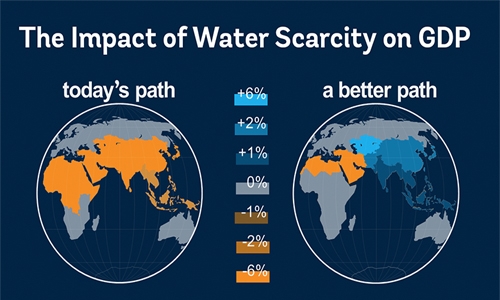ME economic growth to face hurdles, says report
Manama : Middle East will have severe hit on their economic growth in coming decades due to the looming problem of water scarcity in the region, according to a World Bank report.
The data released by World Bank says that the region will witness slump in GDP of at least six per cent due to scarcity of water. The report, titled ‘High and Dry: Climate Change, Water and the Economy’, says the combined effects of growing populations, rising incomes, and expanding cities will see demand for water rising exponentially, while supply becomes more erratic and uncertain.
“MENA will experience lower water availability and higher temperatures. The dependence on water intensive modes of employment such as irrigated agriculture are a concern in the context of further drying and increasing water demands,” the report explains. “The current water intensive agricultural practices might do much more harm than good.”
The projections suggest that trade becomes distorted when countries in arid areas continue to produce water-intensive goods at ever-increasing financial and social cost, contrary to their natural comparative advantage.
“Unless significant action is taken, water challenges due to climate change will significantly impair global economic growth. And even under favourable assumptions, some of the most fragile regions are expected to see growth declines, including the Middle East, the Sahel, and Central Africa. This is troubling not only from a wealth and prosperity standpoint, but also for the effect that this slowdown will have on poverty alleviation,” it warns.
Climate change will have the biggest impact on food security in regions, which are already amongst the most insecure. “Countries, which have placed most available arable land under cultivation, face high demand for irrigation as well as other water uses relative to supply, are likely to face the greatest challenges,” argues the World Bank report.
Across the Middle East and North Africa, the lack of surface flows and reliance on non-renewable groundwater reserves for irrigation makes agriculture especially vulnerable to predicted warming across the region.
The report follows the appointment last month of ten heads of government to a High Level Panel chaired by the UN and World Bank to mobilise effective action to accelerate the implementation of Sustainable Development Goal 6, which focuses on ensuring the availability and sustainable management of water and sanitation for everyone.
“There is a silver lining,” said the report’s author and a World Bank Lead Economist Richard Damania.
“When governments respond to water shortages by boosting efficiency and allocating even 25 per cent of water to more highly-valued uses, losses decline dramatically and for some regions may even vanish. Improved water stewardship pays high economic dividends,” he added.
Related Posts

